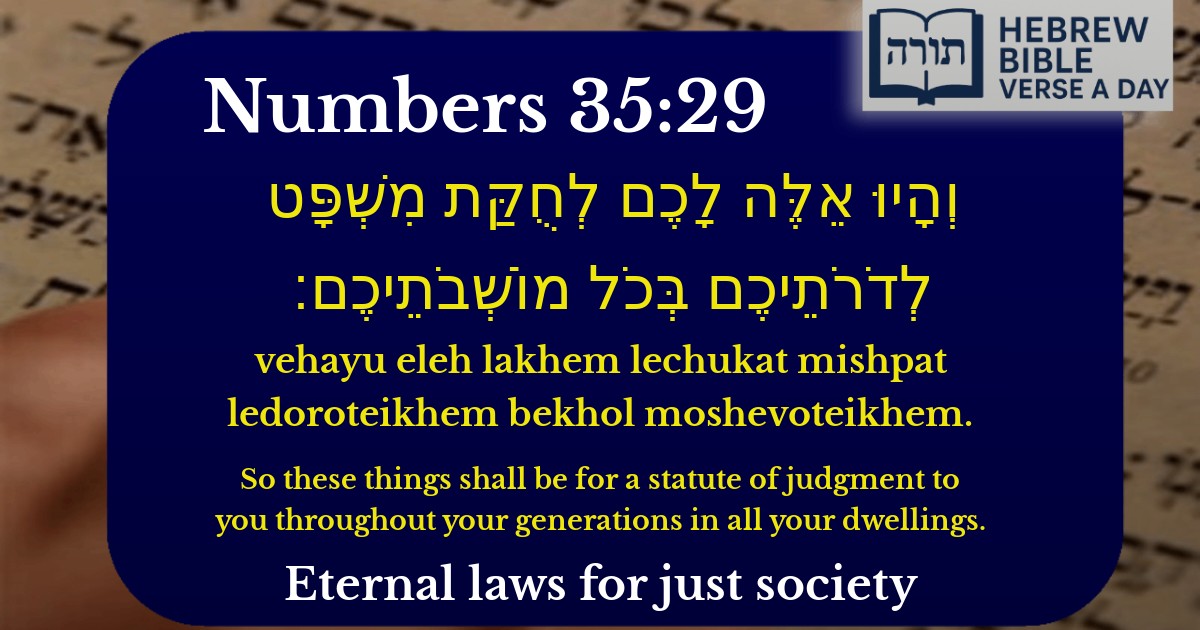Join Our Newsletter To Be Informed When New Videos Are Posted
Join the thousands of fellow Studends who rely on our videos to learn how to read the bible in Hebrew for free!
Hebrew Text
וְהָיוּ אֵלֶּה לָכֶם לְחֻקַּת מִשְׁפָּט לְדֹרֹתֵיכֶם בְּכֹל מוֹשְׁבֹתֵיכֶם׃
English Translation
So these things shall be for a statute of judgment to you throughout your generations in all your dwellings.
Transliteration
Vehayu eleh lakhem lechukat mishpat ledoroteikhem bekhol moshevoteikhem.
Hebrew Leining Text
וְהָי֨וּ אֵ֧לֶּה לָכֶ֛ם לְחֻקַּ֥ת מִשְׁפָּ֖ט לְדֹרֹתֵיכֶ֑ם בְּכֹ֖ל מוֹשְׁבֹתֵיכֶֽם׃
Parasha Commentary
📚 Talmud Citations
This verse is quoted in the Talmud.
📖 Sanhedrin 56b
The verse is referenced in the discussion of the Noachide laws and the establishment of statutes for all generations.
📖 Makkot 23b
The verse is cited in the context of discussing the eternal nature of certain commandments and their application in all dwelling places.


Context in the Torah
The verse (Numbers 35:29) appears in the context of the laws concerning the cities of refuge (ערי מקלט) and the procedures for handling cases of unintentional manslaughter. It establishes that these laws are eternal and binding for all generations, regardless of where the Jewish people reside.
Rashi's Explanation
Rashi (Rabbi Shlomo Yitzchaki) comments on this verse by emphasizing that the phrase "לְחֻקַּת מִשְׁפָּט" (a statute of judgment) indicates that these laws are immutable and must be upheld by the courts in every generation. He notes that the term "בְּכֹל מוֹשְׁבֹתֵיכֶם" (in all your dwellings) teaches that these laws apply even outside the Land of Israel, underscoring their universal and timeless nature.
Rambam's Perspective
In Mishneh Torah (Hilchot Rotzeach 8:4), the Rambam (Maimonides) elaborates that the cities of refuge and their associated laws remain in effect even when the Sanhedrin is not convened. This reinforces the idea that the Torah's judicial statutes are perpetual obligations, not contingent on specific historical or political circumstances.
Midrashic Insight
The Midrash Tanchuma (Masei 10) connects this verse to the broader principle of divine justice, teaching that the laws of the cities of refuge reflect Hashem's mercy even in cases of accidental wrongdoing. The phrase "לְדֹרֹתֵיכֶם" (throughout your generations) is interpreted as a reminder that justice must be administered with the same care and precision in every era.
Halachic Implications